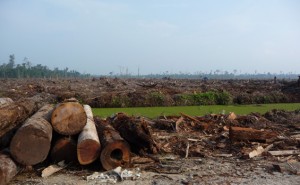 The UK Guardian once referred to Asia Pulp & Paper (APP) as “one of the most destructive companies on the planet.”
The UK Guardian once referred to Asia Pulp & Paper (APP) as “one of the most destructive companies on the planet.”
The following is a brief synopsis of why that description fits.
A History of Bad Practices and Broken Promises
Over 2 million hectares of rainforest have already been destroyed in Indonesia to feed the pulp and paper sector and its Sumatra-based mega mills. APP is the largest pulp and paper company in Indonesia and China and is the leading beneficiary of the ongoing, wholesale pulping of Indonesia’s rainforests. The devastating effects of all this plundering includes widespread human rights violations, massive carbon emissions and the destruction of habitat essential for the survival of critically endangered Sumatran tigers and orangutans.
Stopping Rainforest Destruction?
APP repeatedly promises investors, customers, environmentalists and the public that it will end its dependence on rainforest wood for its paper—but not just yet. APP has consistently failed to meet its deadlines to eliminate rainforest wood from its pulp mills, first set for 2004, then moved to 2007, then revised to 2009, and most recently suggested for 2015.
Honoring Financial Agreements?
In 2004, APP promised to protect High Conservation Value Forests (HCVFs) and reach “full sustainability” as part of a legally binding US$6 billion debt “Master Restructuring Agreement” with Western financial institutions and Export Credit Agencies. As of March 2012, APP still remains in gross violation of this agreement.
Addressing Community Conflict?
With land concessions totaling an area eight times larger than all of Rio de Janeiro, APP’s pulp plantation expansion plans are fueling widespread conflict with local communities in Indonesia. In one of the most shocking cases, in late 2010 dozens of persons from one Sumatran community blocked barges with equipment used in pulp operations on their claimed lands in protest of their rights to community forest lands being given over to APP for pulp plantations. This conflict resulted in police violence and one fatality.
Avoiding Illegal Logging?
Indonesia’s Ministry of Environment has recently revealed plans to sue APP for illegal logging. The lawsuit is seeking $225 billion for social and environmental damages. As much as half of all harvested wood in Indonesia is estimated to be illegal. A recent 2012 investigation found illegal ramin wood fiber being used in APP’s products.
Protecting the Climate?
By ignoring major emissions from deforestation and peat and disingenuously counting its plantations as carbon sinks, APP claims to have a positive impact on the climate. A comprehensive accounting, however, shows APP in Indonesia to be responsible for total carbon emissions at levels higher than most countries, including Denmark. Far from being positive for the climate, APP-produced paper has a climate impact that is 55-70 times higher per ton than recycled paper available in North America.
Supporting Tiger Conservation?
There are only 400 Sumatran tigers left in the wild. Their survival depends on conserving what remains of their critical rainforest habitat. Nonetheless, even as APP promises to protect tigers, clearance of tiger habitat to feed APP’s pulp and paper mills is well documented.
Asia Pulp & Paper’s egregious forest practices have alienated major consumer brand companies around the world, including Danone, Office Depot, Levi’s and many others who will not buy from APP.